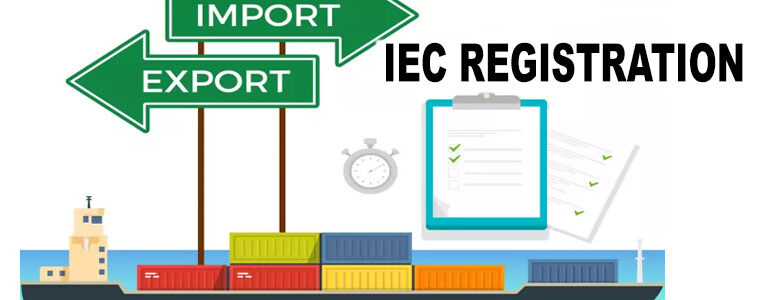Import Export Code (IEC) Registration
- Home
- portfolio
- Registrations
- Import Export Code (IEC) Registration

In today’s highly competitive environment, businesses aspire to expand beyond domestic boundaries. The ease of global business has significantly improved with the rise of the internet and technology. However, venturing into international trade requires adherence to various procedures and legal requirements, including obtaining specific registrations and licenses. One such essential requirement for importing into or exporting from India is the Import Export Code (IEC) license, also known as the Importer-Exporter Code.
To engage in import and export activities in India, a business needs to obtain an Importer Exporter Code (IEC), commonly known as the IEC number. This ten-digit unique code is issued by the Directorate General of Foreign Trade (DGFT). Therefore, before importing goods into India, it’s crucial for the importer to ensure that the business has both GST registration and the IEC number. These are essential for customs clearance.
Failure to have both the IEC code and GST registration can lead to serious consequences. The imported goods may get stuck at the port, incurring demurrage charges, or even facing the risk of being destroyed. In essence, obtaining these registrations is a key step to ensure smooth and compliant import processes.
Situations where IEC is required:
- When an importer has to clear his shipments from the customs then it’s needed by the customs authorities.
- When an importer sends money abroad through banks then it’s needed by the bank.
- When an exporter has to send his shipments then it’s needed by the customs port.
- When an exporter receives money in foreign currency directly into his bank account then it’s required by the bank.
At Legal Parivar, we specialize in simplifying the IEC Registration process, ensuring entrepreneurs navigate legal formalities seamlessly. Our experienced team is committed to guiding you through every step.
Reach out to us today and take the initial step toward realizing your entrepreneurial aspirations!
Get a FREE Expert Consultation Now!
Import-Export Code (IEC) is not mandatory in the following situations:
- Traders registered under GST do not need IEC; their PAN serves as the IEC for import and export purposes.
- Goods imported or exported for personal use and not for commercial purposes do not require an IEC.
- Import-Export Code is not necessary for government departments, ministries, and specified charitable institutions engaged in import and export activities.
Benefits of IEC Registration:
- Global Expansion: IEC enables businesses to participate in global trade by allowing them to import and export goods and services.
- Legal Recognition: IEC provides legal recognition to the business as an importer or exporter, ensuring compliance with international trade regulations.
- No Requirement for Return Filing: Unlike other registrations, IEC does not impose the obligation of regular return filing. Once obtained, it remains valid as long as the business exists.
- Bank Transactions: IEC is essential for businesses involved in international transactions. It is required by banks for processing outward remittances and other financial transactions related to imports and exports.
- Easy Processing of Customs Clearance: Customs authorities require IEC for processing shipments. It facilitates smoother and faster customs clearance for imported and exported goods.
- Facilitates Government Benefits: IEC is a prerequisite for availing various benefits and incentives provided by the government for exporters.
- Brand Building: Having an IEC adds credibility to the business and enhances its image in the international market, making it more trustworthy for global partners.
- Participation in Export Promotion Councils: IEC registration is often a prerequisite for becoming a member of export promotion councils, which offer various advantages and assistance to exporters.
- Operational Flexibility: IEC provides businesses with the flexibility to diversify their product offerings and explore new markets without procedural hindrances.
- Validity Across Branches: Once obtained, IEC is applicable to all branches or business units mentioned in the application, streamlining the process for businesses with multiple locations.
Nature of the Firm obtaining an IEC:
- Proprietorship Firm
- Partnership Firm
- Limited Liability Partnership
- Limited Company
- Trust
- Hindu Undivided Family (HUF)
- Society
Documents & Details Required For IEC Registration :
- Provide a copy of the PAN card for individuals, firms, or companies.
- Submit the proprietor’s voter ID, Aadhaar card, or passport copy.
- Furnish proof of establishment, incorporation, or registration for partnerships, societies, proprietorships, companies, HUF, etc.
- Include proof of the business premise’s address, such as sale deed, lease deed, rent agreement, or utility bills (electricity, telephone, or mobile bills).
- Supply cancel cheque copies of current bank accounts for individuals, companies, or firms.
- DSC or Aadhaar of the Firm’s member for submission
- In case the address proof is not in the Name of the applicant firm, a no objection certificate (NOC) by the firm premises owner.
- Government Fees required to be paid is not included in the above amount.
- Client is liable for all the information provided during the Procurement of IEC.
- Fees Should be paid according to conversation held between the Legal Parivar Team and Client.
IEC Registration FAQ's
Updating the Importer Exporter Code (IEC) profile annually is a requirement. If the profile is not updated, the IEC will be deactivated. Reactivation is possible upon successful updating, provided there have been no violations of the Foreign Trade Policy.
A Digital Signature Certificate is not compulsory to apply for an IEC. The IEC application can be signed through Aadhaar authentication. DSC has been introduced in IEC to strengthen the IEC issuance and modification processes.

